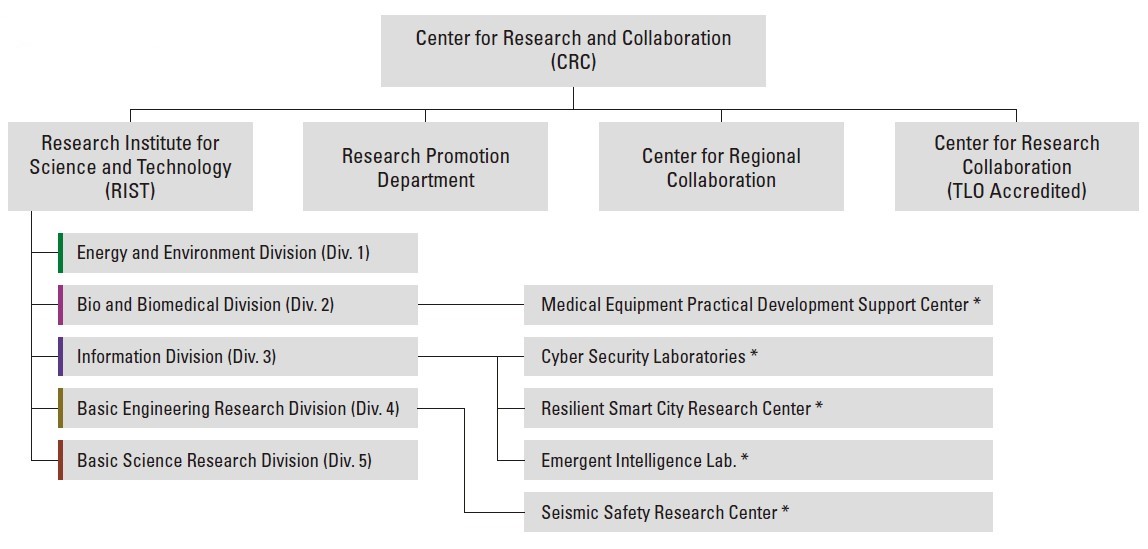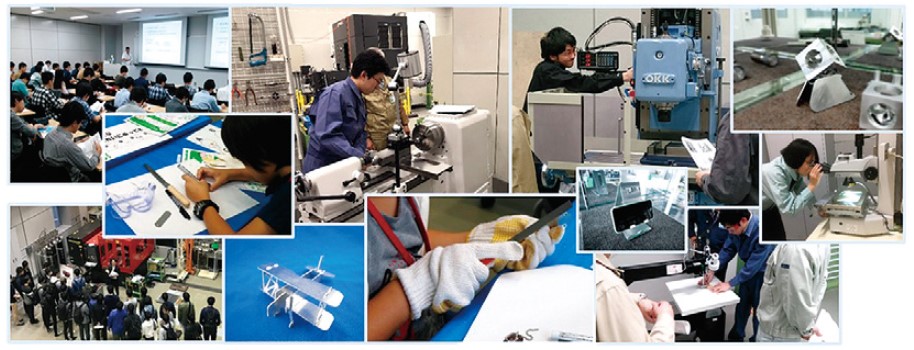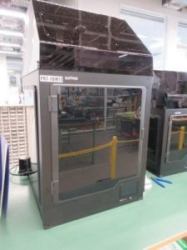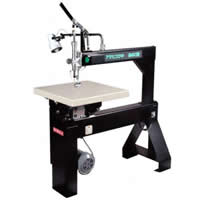TDU Power of Research 1
By leveraging partnerships with industry, government, academia and local communities, TDU actively gives back to society through its research results. This section highlights the organizational framework and activities of the Center for Research and Collaboration (CRC), which plays a leading role in this effort.
CRC Organization Chart
 * Project-based laboratories: Conduct research with externally raised funds for certain periods of time.
* Project-based laboratories: Conduct research with externally raised funds for certain periods of time.
Center for Research and Collaboration (CRC)
CRC sets up university-wide research policies aiming to realize humans’ future dreams and create new industries. The Center also stimulates leading-edge research and development in a wide range of fields. CRC has strong commitment to R&D, especially in the four key research areas – energy and environment, bio and biomedical engineering, information, and safety and security – that are highly demanded by society.
CRC makes every effort to share the results of the research conducted by TDU with our society through various activities such as patent and technical consultations, sponsored and joint research, workshops, and research facility tours.
Research Institute for Science and Technology (RIST)
University-wide comprehensive research institute
RIST was established in 1981 as a university-wide comprehensive research institute and has been positively supporting and unfurling research activities for TDU students and faculties. The Institute focuses on the university’s original mission – knowledge creation – and contributes to society through by promoting project-based research, fostering junior scholars, and research funding review and allocation. RIST has expanded to comprise five divisions for responding to social challenges, developing the require technologies, and prioritizing fundamental study: Energy and Environment, Bio and Biomedical Engineering, Information, Basic Engineering Research, and Basic Science Research.
Energy and Environment Division (Div. 1)
Research for solving energy and environmental issues
Bio and Biomedical Division (Div. 2)
Research for medical and welfare; contributing to humankind broadly
Information Division (Div. 3)
Research for fundamental and applied information science technologies
Basic Engineering Research Division (Div. 4)
Research for basic engineering; focusing on future applications
Basic Science Research Division (Div. 5)
Research for fundamentals; aiming to build sustainable society
Center for Research Collaboration: Technology Licensing Organization (TLO) Accredited
The contact point for academic exchange
The Center for Research Collaboration promotes the development, management, and utilization of intellectual properties developed at TDU, while coordinating with public institutions such as the TLO within the University. In addition to promoting commissioned research and joint research projects, the Center holds lectures, seminars, and exhibitions related to fostering collaboration between industry and academia, as well as technology transfer.
The Center also conducts technical exchange and on-campus technical tours, and introduces research details of work conducted by students and teachers and the patents held by the University. In addition, the Center disseminates information outside TDU regarding the seeds of technology and research results based on the University’s own research projects, as it actively seeks to return the fruits of its research activities to society.
 Role of TLO
Role of TLO
TLO Featured Researches
 Development of a Butterfly-Style Flapping Robot
Development of a Butterfly-Style Flapping Robot
Associate Professor Taro Fujikawa
Department of Robotics and Mechatronics
School of Science and Technology for Future Life
We have been developing a small flapping robot modeled after a butterfly that has a low flapping frequency and a few degrees of freedom of the wings as an observation system in narrow spaces. To realize practical flight of the robot, we analyzed the flight characteristics of a butterfly by performing experiments and using numerical simulations.
 Collective Movement Control Method for Swarm Robots Based on Thermodynamics Model
Collective Movement Control Method for Swarm Robots Based on Thermodynamics Model
Professor Tsuyoshi Suzuki
Department of Information and Communication Engineering
School of Engineering
This research proposes a collective movement control method for a swarm robot system based on the internal energy and the phase transition in a thermodynamic model. This system can move around obstacles in an environment by flexibly changing the aggregation shape in response to virtual attraction and repulsion forces calculated by the model.
 Touch-Sensing Tape Measure with an Automatic Registering Function
Touch-Sensing Tape Measure with an Automatic Registering Function
Professor Toshiya Yoshida
Department of Electrical and Electronic Engineering
School of Engineering
This provides a new tape measure. The tape is a kind of touch panel with long length and flexibility. The location data of the touched point on the surface is automatically registered in a PC. When two points are touched simultaneously the distance data between the two points is measured.
 Grasping Forceps with Sensors for Stiffness Estimation
Grasping Forceps with Sensors for Stiffness Estimation
Associate Professor Kenta Kuwana
Department of Precision Machinery Engineering
School of Engineering
In thoracoscopic surgery, it is difficult for surgeons to feel tactile sense because the surgery is conducted by using special endoscopic instruments. To assist the tactile sense of surgeons, we developed a grasping forceps with MEMS (Micro Electro Mechanical Systems) sensors. We can estimate the stiffness of the target objects by using these forceps.
 A Study of Social Graph Analysis for Preschool Education Using Face Authentication
A Study of Social Graph Analysis for Preschool Education Using Face Authentication
Professor Makoto Hasegawa
Department of Information and Communication
Engineering, School of Engineering
Social graph analysis for preschool education is being discussed. The social graph describes the relation between preschool children, moreover the relation between the children and teachers. It is created by face recognition and authentication systems that performs an identification for children and the preschool teacher from video capturing.
 Syntheses and Evaluation of Stimuli-Responsive Color-Changeable Functional Polymer Complexes
Syntheses and Evaluation of Stimuli-Responsive Color-Changeable Functional Polymer Complexes
Professor Takayuki Suzuki
Department of Applied Chemistry
School of Engineering
We have been studying functional polymer complexes, which show color change repeatedly responding to several stimuli: oxygen in air, hydronium ion (pH), and heavy-metal ions in water. The reversible color change is useful for detecting a certain target substance. Some polymer complexes display photo-reversible adsorption of oxygen or metal ions.
 Advanced Machining Processes in Autonomous Manufacturing Systems
Advanced Machining Processes in Autonomous Manufacturing Systems
Professor Takashi Matsumura
Department of Mechanical Engineering
School of Engineering
Machining processes of advanced materials used for aerospace, automobile, information technology, energy and medical industries were studied to achieve high machining qualities at high machining rates.
The machining phenomena are modelled scientifically to control the processes with the simulations in the autonomous manufacturing systems. The developed simulation software is now running in the manufacturing divisions of aerospace and the automobile companies.
 Development of Novel Solar Cells Using Functional Silicon Nanostructures
Development of Novel Solar Cells Using Functional Silicon Nanostructures
Professor Kenji Hirakuri and Professor Keisuke Sato
Department of Electrical and Electronic Engineering
School of Engineering
We have taken on the challenge of developing silicon nanostructures having outstanding functions such as conductivity, fluorescence, and magnetism. Toward the development of environmental and energy fields, we are engaged in the fabrication of novel solar cells combining functional silicon nanostructures with organic polymers.
TDU Creation and Design Center(TDU-CDC)
TDU Creation and Design Center(TDU-CDC) embodies the founding spirit of Tokyo Denki University: “Respect for Practical Study.” At the heart of TDU’s concept of monozukuri is the provision of a place of learning where students can strengthen their own technical achievements; that supports students’ and instructors’ research efforts; and that contributes to society by providing classes and lectures about the art of manufacturing and supporting enterprises’ technical development. TDU Creation and Design Center(TDU-CDC) cultivates imagination and creativity, providing total backup for people who want to create.Turn your ideas into reality.
 A few examples of the equipment and machinery
A few examples of the equipment and machinery
 Super-compact machining center
Super-compact machining center
 Machining center
Machining center
 3D printer (FDM)
3D printer (FDM)
 3D printer (FDM)
3D printer (FDM)
 3D printer (FDM)
3D printer (FDM)
 3D gauge
3D gauge
 Measuring microscope
Measuring microscope
 Laser processor
Laser processor
 Laser processor
Laser processor
 Panel saw
Panel saw
 Milling machine
Milling machine
 Fret saw
Fret saw
Related content
- Undergraduate Schools
- School of System Design and Technology
- School of Science and Technology for Future Life
- School of Engineering
- School of Science and Engineering
- Graduate Schools Overview
- Graduate School of System Design and Technology
- Graduate School of Engineering
- Graduate School of Science and Engineering
- Graduate School of Science and Technology for Future Life
- Graduate School of Advanced Science and Technology
- International Program(Doctoral Course)